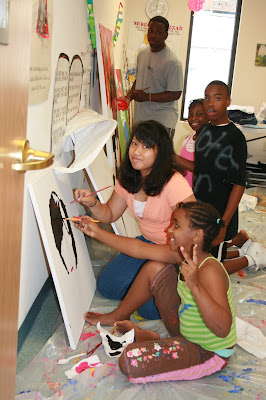
By Michelle Lirazan
It was a sunny and breezy Thursday morning in July. I was ready to go to my friend's house and spend the day there. But as I opened the front door, I saw a man on the front porch sitting quietly. I asked him to leave but he didn't. He was dressed in old clothes that looked unwashed. He was also wearing a weird blue hat on his head. I asked him why he was there, but he didn't answer. I thought he just needed food, and that was all it would take to get him to leave.
I rushed into the house and into the kitchen, and grabbed a P.B. and J. sandwich lying on the dining room table, and a Capri Sun from the refrigerator. Then I rushed back out and handed it to the man. He ate the sandwich and drank the juice but didn't leave.
Maybe money would get him to leave, I thought to myself. I reached into my wallet and took out $50. He accepted it but wouldn't leave.
"Hey, I want that back," I said.
Maybe the police could get him to leave, I thought.
"Um, sir, Dude, whoever you are," I began. "You need to leave my porch before I call the police."
"Go ahead," he replied. "I don't care."
Wow, I thought, this guy's crazy. Normally, a person would have left if you threatened to call the cops. But that threat didn't scare this dude.
"Hey, why don't you go over to the neighbor's house?" I said. "It's bigger and comfier."
"I like this one better," he said.
"Why?"
"This is the only place were I haven't gotten yelled at, and this is where I got served food. I think I'm gonna stay here for a while."
I was about to curse the dude. But then I decided to leave for my friend's house. When I got home at 10 p.m., he was still there.
"Man, you need to leave or else," I yelled.
"Or else what?"
"Or else I'll throw my furniture at you!" I said.
"When you do that," he replied, "could you throw the TV at me first? I wanna watch wrestling!"
"Unbelievable," I said.
"Could you throw the microwave at me, and popcorn too?"
I couldn't believe this guy. But I had a plan. I sneaked into my older brother's room, and grabbed some clothes from his closet. The next day, I gave it to the man, and told him to clean up and get dressed quickly. I showed him to the bathroom and he showered and changed.
"Thanks for the clothes," he said.
"No problem. Come on. I want to take you somewhere."
We got into my silver Mercedes convertible and I headed to the mall. I showed him to a store for men. I told him to look for clothes he wanted. I told him I'd be back for him in half an hour.
I lied. I headed out of the mall and went to the movie with my friends.
At 9 p.m., I arrived home. I had had a long day, and it was enjoyable. I was so happy thinking I'd gotten rid of the man on my porch. But as I got out of my car, I saw him. The man was STILL on my porch!
How had he known the way back to my house?
"Hey," he said, "thanks for taking me to the mall. I had a good day."
I didn't say anything. I went inside the house.
The next day I ordered my Golden Retriever to chase the man off my porch. At first i heard her barking, but then everythign was quiet. I went out to the porch.

My dog was sitting with the man. He was petting the dog.
I give up!
High school student Michelle Lirazan lives in Washington, DC. This is her first published writing. The photo to the right shows Michelle (in pink, smiling) working on a painting at A.R.I.S.I.N.G., a multi-media arts program for high school students supported by the Neighborhood Investment Fund of the Deputy Mayor's Office of Washington, D.C. The program is being hosted by the Fourth Street Friendship Seventh Day Adventist Church.


















